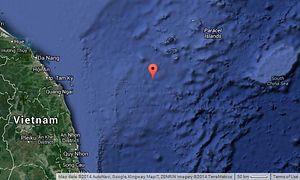With tensions between Vietnam and China still running high, China’s Foreign Ministry responded Thursday to claims that Chinese ships intentionally rammed Vietnamese vessels. China and Vietnam are engaged in a stand-off near a Chinese oil rig set up in the South China Sea, 130 miles from Vietnam’s coast.
An official from China’s Foreign Ministry blamed Vietnam for the rammings, and said that China had used “utmost restraint” in limiting its response to the use of water cannons. Reports in Chinese media quoted Yi Xianliang, the deputy director-general of the Department of Boundary and Ocean Affairs within the Foreign Ministry, as saying that Vietnamese boats had rammed Chinese vessels 171 times. In addition to the rammings, Yi said that Chinese vessels had discovered Vietnamese divers attempting to set up nets and other obstacles to block Chinese boats. Yi also insisted that China’s ships in the area were all civilian, while Vietnam had sent armed vessels. Since the incident, Yi said, China had been forced to increase its security measures.
Ng Ngoc Thu, the vice commandant of Vietnam’s coast guard, directly rebutted these statements in remarks to Reuters. “China has missile ships supporting its civilian ships,” he said. A separate statement from Vietnam’s Ministry of Foreign Affairs said that there were at least 60 Chinese ships escorting the oil rig, “including military ships.” Thu had a larger figure, telling reporters there were 80 Chinese ships in the region.
As Zach noted yesterday, Vietnam showed reporters a video of the purported ramming by Chinese ships. The video appeared to show several collisions, as well as images of injured people receiving medical treatment. Ngo Ngoc Thu said that the injuries had been caused by glass shattered in the collision. At least one of the ships shown in the video was clearly labeled as a Chinese Coast Guard vessel. Thu also drew reporters’ attention to a cannon visible on the deck of one of the Chinese ships.
Vietnam’s Ministry of Foreign Affairs warned that the incident could have a lasting effect on China-Vietnam relations. “China’s action significantly affects the political trust between the two countries, [and] the on-going negotiations on maritime issues between the two sides, including the consultations of the working group for joint development at sea,” Tran Duy Hai, Vice Chair of the National Boundary Commission, said in a press conference.
Yi Xianliang said that China was willing to discuss the matter with Vietnam, but insisted that all Vietnamese ships must leave the area first. Such a demand is not very appealing to Hanoi, as China has shown no signs of being willing to remove either its own ships or the drilling rig at the heart of the dispute. Plus, in the past, Beijing has used mutual withdrawal agreements to its advantage — China gained effective control of the Scarborough Shoal by sending ships to the area after Philippine vessels had departed.
China’s claim to the waters where the drill is currently operating is based on its assumption that the Paracel Islands (administered by China but disputed by Vietnam) generate their own exclusive economic zone (EEZ). The drill is about 17 nautical miles from the closest Paracel Island, Triton Island (Zhongjian Island in Chinese), a fact Yi Xianliang emphasized in his press conference. However, as Ernest Bower and Gregory Poling note for CSIS, it’s not clear that the Paracels (including Triton) actually meet the UNCLOS requirements for generating such an EEZ.
Legal definitions aside, China’s move to drill in a disputed area — and its refusal to acknowledge that a dispute exists — will reinforce perceptions in the Asia-Pacific that China is growing increasingly assertive in defending its territorial claims. The ASEAN Summit scheduled to take place this weekend in Malaysia will provide the first chance for a multilateral response to increased tensions in the South China Sea.

































